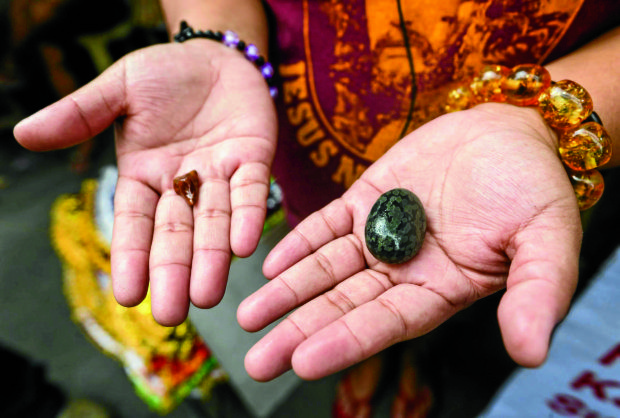
IN DEMAND Street vendor Erica Policarpio shows a “ngipin ng kidlat” (left) believed to protect one from bullets and the “niyog na bato” for supposed invisibility. —LYN RILLON
Oplan Tokhang is the Philippine National Police’s campaign that has prompted thousands of drug users and pushers to surrender.
Street vendors at the periphery of Quiapo Church may have the answer.
Since President Duterte took office and launched his deadly war against drugs, people who fear they may be on his cross hairs have sought the help of charm traders in Quiapo, Manila.
Erica Policarpio, 26, said about 20 male clients looking for stones that promised invisibility and protection from bullets had approached her stall at Plaza Miranda the past months.
Love potion, or gayuma, remains the best-seller, she said. But increasingly men have come to her seeking stones called “niyog na bato,” or stone pellets, or “ngipin ng kidlat,” or teeth of thunder.
“They asked me what the stone ngipin ng kidlat was for. I told them it’s a protection against bullets and knives. They replied: ‘That means I won’t be subjected to tokhang then?’”
These men also wanted to know if buying niyog na bato guaranteed invisibility from policemen.
“If we become invisible,” Policarpio said, recounting her other client’s concern, “that means that police wouldn’t see us anymore?”
Oplan Tokhang, however, has taken a different meaning, especially in slums where many “surrenderers” were later killed by either policemen or unidentified gunmen.
More than 7,000 people, most of them reportedly involved in drugs, have been killed since July 2016.
Some obviously are seeking salvation from the perceived magic of invisibility available in the makeshift shops around the church of the miraculous Black Nazarene.
Policarpio inherited her space from her father, a faith healer, who learned the trade from a Mangyan family in Oriental Mindoro.
She said the stones and petrified seeds, which had been made into bracelets, were all sourced from a supposedly mystical “seventh mountain in Bulalacao” town.
“We refuse customers who specifically ask us for stones that can help them evade Tokhang because we know they’re going to use them for evil deeds,” she said.